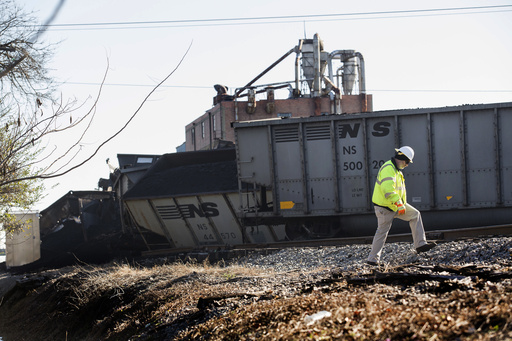
Norfolk Southern has raised alarm about potential shortcomings in railcar inspections after instructing employees to limit their checks to a mere minute per railcar. The railroad claims this guideline is aligned with current industry standards and has no intention of penalizing employees for not meeting this timeframe.
Railway worker unions have expressed growing concerns over the rushed nature of inspections, attributing this to the loss of a third of all jobs as companies adopt a streamlined operational model. This model, they argue, has contributed to safety deficiencies across the industry.
Chief Safety Officer of the Federal Railroad Administration, Karl Alexy, noted that there was already a close watch on inspection durations throughout the industry prior to Norfolk Southern’s recent ruling. He has stated that the agency would monitor how Norfolk Southern implements its new guideline. “If they truly enforce this timeframe, it raises significant worries about defects going unrecognized, as it is indeed an exceedingly brief period,” Alexy remarked.
Safety apprehensions intensified after a Norfolk Southern freight train derailed in February in East Palestine, Ohio, resulting in a release of hazardous materials and a subsequent fire. Following this incident, the railroad and the wider industry committed to implementing safety reforms. Nevertheless, Alexy observed that safety records have not shown marked improvement lately.
Concerns about rapid inspections are indicative of railroad workers’ overarching anxiety regarding the Precision Scheduled Railroading (PSR) model, which emphasizes efficiency but may compromise safety. Alexy indicated that numerous experienced workers were lost due to job cuts instigated by PSR and setbacks during the pandemic, forcing railroads to rely on less seasoned staff still learning the job’s risks.
Despite Norfolk Southern’s previous assertions about prioritizing safety by mitigating inspection speed, the newly implemented quick inspection policy appears to counteract those claims. This directive was issued shortly after Mark George was appointed as the railroad’s CEO.
Norfolk Southern isn’t the only railroad advocating for expedited inspections; findings from the Federal Railroad Administration noted that carmen spent about 1 minute and 38 seconds examining each car while a federal inspector was present. However, in the absence of an inspector, the average inspection duration plummeted to approximately 44 seconds per car.
The Transportation Communications Union, representing the carmen responsible for inspections, argues that it is impractical to examine the more than 90 inspection points mandated on each railcar within such a narrow timeframe, highlighting that significant oversights are likely to occur. National Legislative Director David Arouca mentioned that carmen were visibly frustrated upon learning of the new one-minute inspection guideline, especially after years of voicing concerns over hurried checks.
“It’s impossible to visually inspect 90 points in 30 seconds (per side) repeatedly across many cars without overlooking critical issues,” Arouca stated, emphasizing the challenges when inspecting older railcars while using an ATV.
Government inspections have revealed that between 13% to 15% of rail cars exhibited defects following inspections by railroads; however, most of these issues were not serious enough to result in derailments. Common oversights included bent handrails used by workers to climb aboard the cars. Alexy mentioned that while noted deficiencies might appear minimal, they nonetheless indicate an ongoing risk.
Moreover, Alexy pointed out that even with extended inspection times, identifying flaws responsible for derailments—such as faulty axle bearings or cracked wheels—remains inherently difficult. For instance, the East Palestine derailment was traced back to a faulty bearing that became overheated but was not detected in time.
Norfolk Southern has indicated that this new one-minute standard will help the company assess whether they have adequate inspection personnel available at each location and to coordinate with car owners for maintenance. “Employees are certainly not expected to ignore safety concerns. If a defect is encountered, workers are obliged to address it immediately or remove the car for further checks,” noted Norfolk Southern spokesperson Heather Garcia.
Alexy believes that if this new rule is legitimately utilized in a manner that prioritizes safety, it may not pose a significant issue. However, he warned that if it devolves into an extreme, it could ultimately result in a regression of safety protocols at Norfolk Southern, especially in the wake of the East Palestine incident. The real test will be how local railroad managers enforce this rule across Norfolk Southern’s operational regions in the eastern United States.
